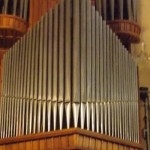Well, to start with, nothing so far as the instrument itself is concerned. The problems (and there are many) have to do with the people affiliated with the organ — at least since the second half of the Twentieth Century. And what do I mean by that? The organist asks indignantly. Let’s take a look and see what happened.
During most of its long and glorious history the organ was always considered the supreme instrument of Western music. The fact that it is the oldest keyboard instrument, therefore the most complex mechanically, gave it a cache that no other instrument had, or has to this day. No other single instrument was capable of duplicating or exceeding the multi-voiced textures of a vocal ensemble than the organ: This capability in turn, helped pave the way to the development of the polyphonic complexities unique to Western music. It wasn’t until the development of the 18th Century instrumental ensemble which became the foundation of our modern symphonic orchestra that the organ finally encountered any competition in this area. Even then, as now, the orchestra does not have the frequency range nor, in the case of a comparably sized organ, the dynamic range. Moreover, up through the first decade of the Twentieth Century the organ was an immensely popular instrument. Most of the great composers before or since Bach have at least dabbled with the instrument. Mendelssohn was a virtuoso and wrote extensively for it, Brahms wrote for the instrument early in his career and then found consolation in it at the very end of his life. Mozart loved the organ as did Liszt who wrote a number of substantial pieces for it. Even Beethoven wrote a few, albeit inconsequential, pieces. Although in the 19th Century the piano became the more popular instrument primarily out of convenience, it was to the organ recitals that people flocked to hear transcriptions of their favourite orchestral works and the great works J. S. Bach.
So what happened? Why is this magnificent instrument nowadays relegated to near pariah status in our present world? A number of mitigating factors can immediately be considered: 1. The sound recording brought the world’s orchestras into people’s homes making transcriptions and silent movie accompaniment obsolete. 2. Since the silent film era, the organ became the instrument of choice for mad scientists and evil beings in the movies. Needless to say, this has done irreparable damage to the image of the organ, stereotypically associating it with either excessive church piety or horror movies. Neither gives a honest assessment of the majesty of the organ. The latter has finally begun to fade as a pejorative; but, only through the indefatigable efforts of such great masters of the console as E. Power Biggs and Virgil Fox, and the gradual passage of time has this image begun to disappear from the public memory.
Nevertheless, it’s the stodgy image of the “church organ” which continues to encroach on the realm of the king of instruments. Stereotypes abound regarding this image. First, there is the phenomenon of Lizzie Leftfoot, more than likely a local piano teacher or elementary school teacher, who really isn’t an organist at all, but does what she can on Sunday to play the hymns and accompany the choir. Ofttimes (and yes, it usually is a woman) she volunteers her services out of devotion to her church since there isn’t a real (i.e., professional) organist around to do the job properly. The result is this lingering impression that being a church musician really doesn’t involve much effort. She can read music, so, therefore, she can play the organ for church. One of the side effects of this mentality is the delusion that being a church organist doesn’t require much expertise. A local garage band with a bunch of musical illiterates is treated more credulously.
Second, and not unrelated, churches reflect our culture in that they think music should be free or nearly free and, for some reason, to be a musician, particularly a classically trained church musician, it is improper to expect monetary reimbursement. After all, isn’t one using her gifts in service to the church viz. an higher calling? For some reason the clergy with their ostensible higher calling, are lured to a church with not only a salary, but pensions and health insurance and in most cases either a housing allowance or outright housing. Yet, the organist/choir director, by virtue of being merely a musician, barely receives a weekly part-time stipend, for which he or she is supposed to be grateful, the man-hours of daily practise and preparation and years of training notwithstanding. Suddenly the church cries poor: “well we’re a small parish and can’t afford (read: want) to pay the organist very much. The result of this dismal attitude is that the standard of playing in most churches is at best sub-par: “you get what you pay for”(sic), as the saying goes. Yet, with pathetic irony, churches are constantly lamenting over what seems to be an apparent shortage of organists. Again, via the church, we have a reflection of our culture’s bias against serious music; treating it as being frivolous or insignificant; or as played under the above circumstances — boring. The end result: the organ is that boring, turgid, bland instrument in church that old Mrs. Leftfoot plays every Sunday. Such is the plight that few people, mostly in smaller churches, rarely get to experience the emotionally and spiritually energising thrill of dynamic, musically charged hymn playing.

